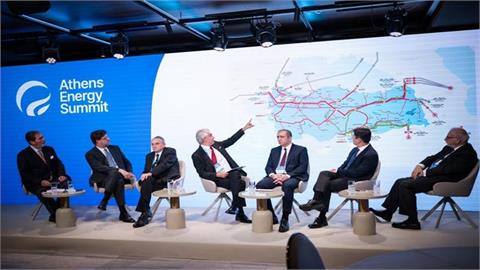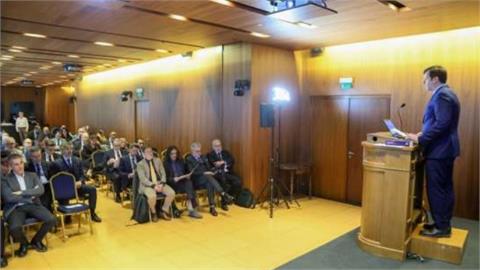Following an invitation by the organisers IENE's Chairman and Executive Director Mr.Costis Stambolis travelled to Vienna earlier this week where he participated in the closed workshop organised by USEA in association with USAID on the region's Electricity Market Initiative (EMI). The above organisations have undertaken a multi- year programme to help enhance the integration and operation of power markets in Southeast Europe.
Following an invitation by the organisers IENE's Chairman and Executive Director Mr.Costis Stambolis travelled to Vienna earlier this week where he participated in the closed workshop organised by USEA in association with USAID on the region's Electricity Market Initiative (EMI). The above organisations have undertaken a multi- year programme to help enhance the integration and operation of power markets in Southeast Europe.
Since April 2018, USAID/USEA has convened a series of working group meetings under the Electricity Market Initiative (EMI) to address regional gaps and opportunities for consolidation in electricity market and grid operations. Comprised of transmission system and market operators as members, as well as regulators and regional stakeholders as participants, the EMI Working Group (EMI WG) focuses on key issues and technical support in such areas as: regional market consolidation; renewable energy system (RES) integration; and system operations. Present in the February 25/26 Vienna meeting were approx. 80 participants from electricity utilities and electricity market operators from all different countries of SEE.
IENE's chairman had been asked by the organisers to present the Institute's outlook on the region's gas prospects and how these were to affect power generation at a time when decarbonisation of electricity generation is becoming a priority, especially following EU's New Green Deal as announced last December. In his presentation ( see here) Costis Stambolis emphasised that the switch to natural gas for power generation was the only realistic immediate option available to power generators for fast decarbonisation while maintaining the necessary base load and market flexibility, which ultimately will see the transition to renewables and other future options (e.g. hydrogen). The IEA, observed IENE's chairman, has found out that by switching to gas has already helped limit the rise in global emissions since 2010, alongside with the deployment of renewables and nuclear energy and improvements in energy efficiency.
Today, noted IENE's head, the gas sector in SEE faces significant challenges which are mainly related to the ongoing process of market transformation within the EU but also as a result of global developments, where the fast rise of LNG is testing market norms. The market structure, in terms of ownership and regulation framework, being under consideration for a long time, is currently changing in many countries The role of the state is being reconsidered and the level of privatization and liberalization of gas markets shapes the business environment in each country, creating new opportunities for market players, especially in the retail sector.
In the case of Turkey for example, the presence of new market entities, as a result of the privatization process, illustrates the magnitude of change that the gradual introduction of competition has brought about. In Greece where the gas market is fully liberalized, we have seen a radical shift in terms of imports, now dominated by cheap LNG, and huge changes at consumer market level. In the case of EU member states in SE Europe and those of the Energy Community, the main challenges include reform efforts for improving the gas market model in line with EU thinking and directives, while drawbacks can be seen in the continuing dominance in many countries’ public gas markets structure, the absence of market competition and the lack of diversification of gas supply.
Special reference was made by Costis Stambolis on the LNG prospects in SE Europe and the East Mediterranean in particular, as those were far better placed today than they were five years ago, with new projects getting ready to progress and LNG clearly emerging as a priority fuel for several industrial consumer groups helped by lower prices and increased availability. Hence, LNG has emerged as a realistic alternative fuel in SE Europe as it increases security of supply through multiple and independent supply sources, provides the opportunity for new LNG suppliers (e. g. USA, Australia) etc. to export gas to the region, enhances pricing flexibility and safer gas transportation and can also support underperforming gas pipeline projects.
The role of the South Corridor and its great importance in diversifying gas supplies in Europe and SEE in particular was further stressed by IENE’s chairman. He went on to analyse a whole series of projects related to the South Corridor and its expanded version, which includes cross border interconnections, underground gas storage facilities, LNG terminals and additional major pipelines such as the East Med.
Concluding his 50’ long presentation Costis Stambolis made extensive reference to gas price formation and the increasingly important role of gas trading hubs. According to EFET’s scoreboard there is a number of nascent such hubs in the SEE region with Greece and Turkey leading the race with some of them expected to become fully fletched, or established hubs, by 2021/2022.




